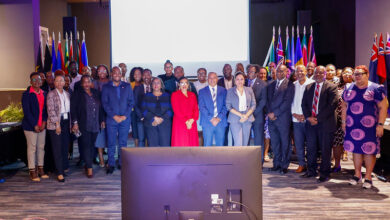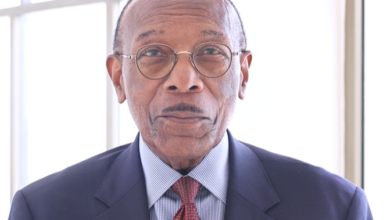The CARICOM Region should look to breathing much cleaner air and accessing cheaper electricity over the next few years with the execution of the Caribbean Renewable Energy Development Programme (CREDP).
A Global Environmental Facility (GEF) grant of US$3.726 million made available through the United Nations Development Program (UNDP) is the most recent addition to the international financial assistance already secured for the Programme.
The Agreement to support the CREDP, signed between CARICOM and UNDP, at a brief ceremony held at the CARICOM Secretariat in Georgetown on Monday, was described by Secretary General of CARICOM, Mr. Edwin Carrington, as “another significant milestone in the CARICOM-UNDP Cooperation”.
Noting that the Caribbean region is heavily dependent on fossil fuel combustion with petroleum products accounting for an estimated 93 per cent of commercial energy consumption, he predicted, “it is expected that renewable energy technologies will provide at least 10% percent of the region's commercial electricity by 2015”.
With this savings in electricity, the Region will also benefit from reduced foreign exchange investments in the energy sector. In addition, “it will help to remove barriers to renewable use and contribute significantly to the Region's energy balance. This is a major boost to sustainable development in the Caribbean”, the Secretary General added.
This second phase of funds from the GEF brings to US$ 11.557 million in assistance from the international and regional Community for renewable energy efforts.
His Excellency Jan Sand Sorensen, Resident Representative of UNDP in Guyana in his brief statement during the Ceremony noted the importance of exploring and promoting new and alternative ways of providing clean energy to the Caribbean.
“The populations in the countries of the Region are small compared to the rest of the world and therefore there is tremendous benefit for regional cooperation and regional delivery of some energy related activities,” he added.
Stressing that the UNDP sees it role not only as a partner but also as a broker for new Agreements and projects in the Caribbean Region. H.E. Sorenson said, “This project from UNDP's perspective is a ground breaking one, because of the strong emphasis it places on facilitating private sector activities in a traditionally government controlled sector.”
Many governments of the Region, in recent times, have privatized state-owned/operated electric utility companies as part of new energy policy thereby reducing government expenditure in that sector.
The Caribbean Renewable Energy Development Programme is meant to develop strategies and mechanisms to overcome market barriers for renewable energy and to reduce investment risks in the Caribbean Region. Managed and executed by the CARICOM Secretariat under the leadership of Dr. Roland Clarke, the CREDP has also secured funding from the German Aid Agency, GTZ, in the sum of US$2.2 million and is further supplemented by in-kind contributions of US$ 5.631 million from participating governments, the CARICOM Secretariat, and the Global Sustainable Energy Island Initiative (GSEII) through the Organisation of American States (OAS).
It is hoped that the project will increase the share and mix of renewable energy whilst reducing carbon dioxide (CO2) emissions by 388,159 tons per annum by the year 2007.





